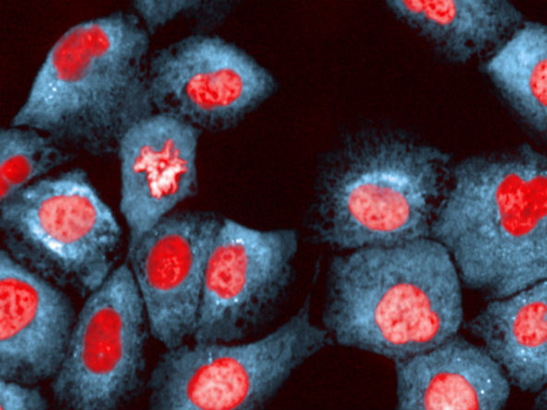
Breast epithelial cells under estrogen-receptor stress (photo: Chris Bakal 2014)
Breast cancer cells can become resistant to a common anticancer drug in a variety of different ways — suggesting that tailored treatment combinations to overcome resistance may be required for each patient.
Drugs that inhibit proteins called cyclin-dependent kinases (CDKs) have become an important part of treatment for patients with estrogen-receptor (ER) positive breast cancer. These breast cancers make up the majority of cases and inhibiting the CDK protein stops the cancer cells from multiplying.
However, most tumours eventually find ways to sidestep treatment and become resistant to the drugs. New research has shown that this resistance can develop in a variety of ways, and so many different strategies may be required to combat it.
Dr Nicholas Turner, leader of the Molecular Oncology team at The Institute of Cancer Research, London, and consultant at The Royal Marsden NHS Foundation Trust, said: “We set out to identify how ER-positive breast cancer cells become resistant to CDK4/6 inhibitors, such as the drug palbociclib, in order to identify potential combinations of anticancer agents that could delay the onset of resistance – or overcome resistance once it has arisen.
“Our preclinical studies identified a triplet therapeutic combination that could significantly delay the onset of resistance, and this combination is being tested in phase II clinical trials. However, we also found that resistance arises through multiple mechanisms, suggesting that we will need to develop tests to identify the particular mechanism driving resistance in each patient in order to determine the best future treatment options.”
Dr Turner worked with colleagues in Spain to screen a library of 3,530 compounds that could help prevent drug resistance in these patients.
Screening for resistance
They found that a combination of three drugs — a CDK4/6 inhibitor, a hormone therapy (fulvestrant), and a PI3K inhibitor — provided the best tumour control compared with similar two-drug combinations.
Molecular analysis identified several mechanisms by which ER-positive breast cancer cells became resistant to CDK4/6 inhibitors.
“Our next step is to look at tumor samples from patients with ER-positive breast cancer that has become resistant to CDK4/6 inhibitors to determine whether the mechanisms of resistance that we have identified in our preclinical study reflect what happens in the clinic,” said Turner. “If they do, we will need to develop tests to screen for these different resistance mechanisms so that patients can be directed to the most appropriate treatment options.”
The study was published in Cancer Research and supported by Breast Cancer Now, the Mary-Jean Mitchell Green Foundation, the Avon Foundation, Cancer Research UK, the National Health Service, the Instituto de Salud Carlos III, Agència de Gestió d'Ajuts Universitaris i de Recerca, GHD, the FERO Foundation and the Orozco family.
